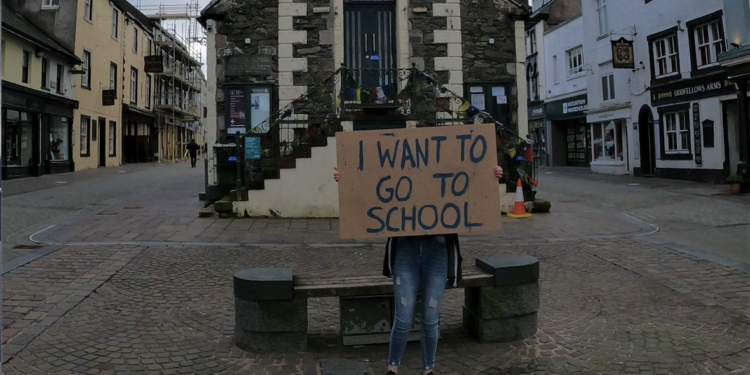A greater number of children in poorer areas reported falling behind classmates because of COVID-19 and lockdowns than those in less deprived areas, according to new data from the ONS. The Times has more.
Data released on Friday revealed 42% of GCSE students in the most deprived areas said they fell behind due to Covid “disruption” compared with 26% in more affluent areas.
By the third national lockdown in England, in 2021, young people in the most deprived areas were also less likely to report that their school had provided real-time online learning. Eighty-one per cent told the Office for National Statistics (ONS) that their school had done so, compared with 93% in the least deprived areas.
The ONS said this might suggest schools in less deprived areas faced fewer barriers in improving their online provision compared with schools in more deprived areas.
A gap in learning emerged during the third lockdown, the ONS said, as no differences were found across deprivation groups during the first one in 2020.
Only just over a quarter, or 27%, of young people agreed that their school, employer, or training provider was offering additional support to help them with lost learning during Covid. However, those living in the most deprived areas were, at 31%, more likely to report this than those living in the least deprived areas – and young people in the most deprived areas were also less likely to report feeling unmotivated and struggling to engage with studies or work during the first and third lockdowns.
Chris Shine, from the ONS, said it would continue its analysis of schoolchildren, to show how the pandemic may have “impacted on their futures”. He said: “These results confirm a lot of what we heard at the time about the challenges students faced. But we also see that students from the most deprived areas were particularly motivated to overcome these barriers.”
The study includes those in state comprehensive, grammar and independent schools, who were in Year 11 in the 2020-21 academic year. It found that during the first national lockdown, 40% of students attended school in person, if only for a few days or part-time. By the third national lockdown, from January to March 2021, this had dropped to 17%.
The ONS said there were clear differences across deprivation groups by this stage, with a significantly higher proportion of those in the most deprived areas attending school in person.
Worth reading in full.











To join in with the discussion please make a donation to The Daily Sceptic.
Profanity and abuse will be removed and may lead to a permanent ban.
Together with a friend we started collecting old laptops during lockdown 2. We stripped out the Windows operating system & replaced with Linux. As a result even 10 year-old laptops worked tolerably well. We gave out over 200 working machines to local kids. Every night I would meet desperate parents in the car-park of a local Methodist church (until the church banned us because we didn’t observe covid protocols).
Some nights we would have 10 or more families queuing up for a laptop.
Eventually, the Government got its act together, laptops were given to the kids but only after they’d gone back to school.
It was inevitable that these poorer kids fell behind, no laptop, no IT support, often no WiFi, kids sharing a pc. That they didn’t fall further behind is the miracle.
Well done for doing something so positive to help these disadvantaged kids.
From what I see, it’s the kids in the so-called “affluent” areas that are the most disadvantaged. Both parents working to pay off huge mortgages, ferried everywhere in cars etc.
But yes, we have all – children and adults alike – been deprived of so much over the last three years. Some of us are not happy with this state of affairs, while the majority seem to even enjoy it…
Congratulations! You have my tremendous admiration.
What a surprise. A minor tweak to the causality statement: because of the over reaction to COVID-19, e.g. the lockdowns…. may be in order for many of us.
This hardly needed investigation. It was absolutely obvious to anyone with eyes to see!
My daughter in law organised online yoga sessions free of charge for primary school children who at the time had absolutely NO online tuition. The teachers had not been sufficiently motivated to overcome the hurdles!
Meanwhile privately educated children with their own computers, quiet study space and indoor and outdoor recreational facilities had a full curriculum online almost from the outset.
In the secondary and higher education sector the problems seriously interrupted GCSE and A level studies limiting the life chances of poorer students even more than normal.
Shame on those who colluded with this disgraceful disregard for our children and young people – and totally unnecessary!